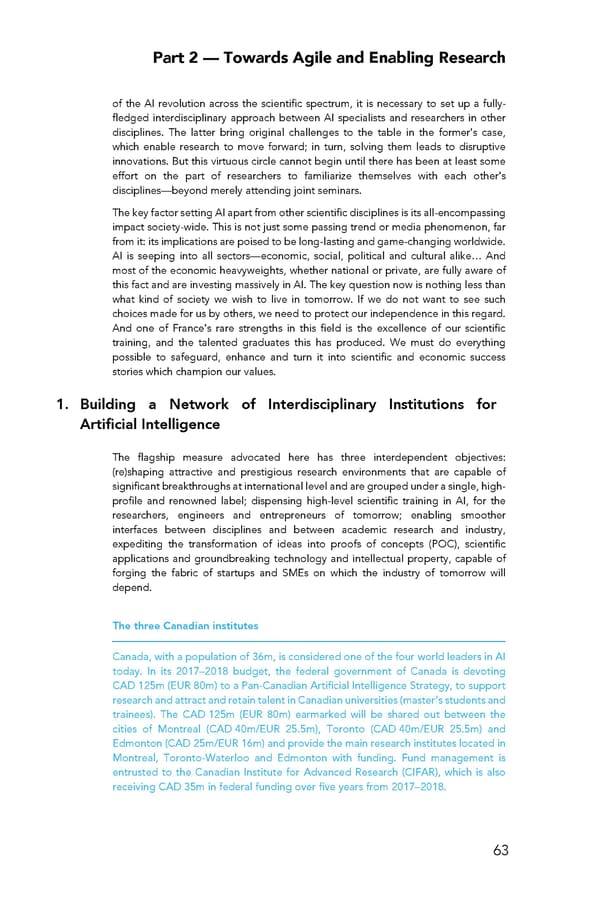Part 2 — Towards Agile and Enabling Research of the AI revolution across the scientific spectrum, it is necessary to set up a fully- fledged interdisciplinary approach between AI specialists and researchers in other disciplines. The latter bring original challenges to the table in the former's case, which enable research to move forward; in turn, solving them leads to disruptive innovations. But this virtuous circle cannot begin until there has been at least some effort on the part of researchers to familiarize themselves with each other's disciplines—beyond merely attending joint seminars. The key factor setting AI apart from other scientific disciplines is its all-encompassing impact society-wide. This is not just some passing trend or media phenomenon, far from it: its implications are poised to be long-lasting and game-changing worldwide. AI is seeping into all sectors—economic, social, political and cultural alike… And most of the economic heavyweights, whether national or private, are fully aware of this fact and are investing massively in AI. The key question now is nothing less than what kind of society we wish to live in tomorrow. If we do not want to see such choices made for us by others, we need to protect our independence in this regard. And one of France's rare strengths in this field is the excellence of our scientific training, and the talented graduates this has produced. We must do everything possible to safeguard, enhance and turn it into scientific and economic success stories which champion our values. 1. Building a Network of Interdisciplinary Institutions for Artificial Intelligence The flagship measure advocated here has three interdependent objectives: (re)shaping attractive and prestigious research environments that are capable of significant breakthroughs at international level and are grouped under a single, high- profile and renowned label; dispensing high-level scientific training in AI, for the researchers, engineers and entrepreneurs of tomorrow; enabling smoother interfaces between disciplines and between academic research and industry, expediting the transformation of ideas into proofs of concepts (POC), scientific applications and groundbreaking technology and intellectual property, capable of forging the fabric of startups and SMEs on which the industry of tomorrow will depend. The three Canadian institutes Canada, with a population of 36m, is considered one of the four world leaders in AI today. In its 2017–2018 budget, the federal government of Canada is devoting CAD 125m (EUR 80m) to a Pan-Canadian Artificial Intelligence Strategy, to support research and attract and retain talent in Canadian universities (master’s students and trainees). The CAD 125m (EUR 80m) earmarked will be shared out between the cities of Montreal (CAD 40m/EUR 25.5m), Toronto (CAD 40m/EUR 25.5m) and Edmonton (CAD 25m/EUR 16m) and provide the main research institutes located in Montreal, Toronto-Waterloo and Edmonton with funding. Fund management is entrusted to the Canadian Institute for Advanced Research (CIFAR), which is also receiving CAD 35m in federal funding over five years from 2017–2018. 63
 For a Meaningful AI - Report Page 63 Page 65
For a Meaningful AI - Report Page 63 Page 65